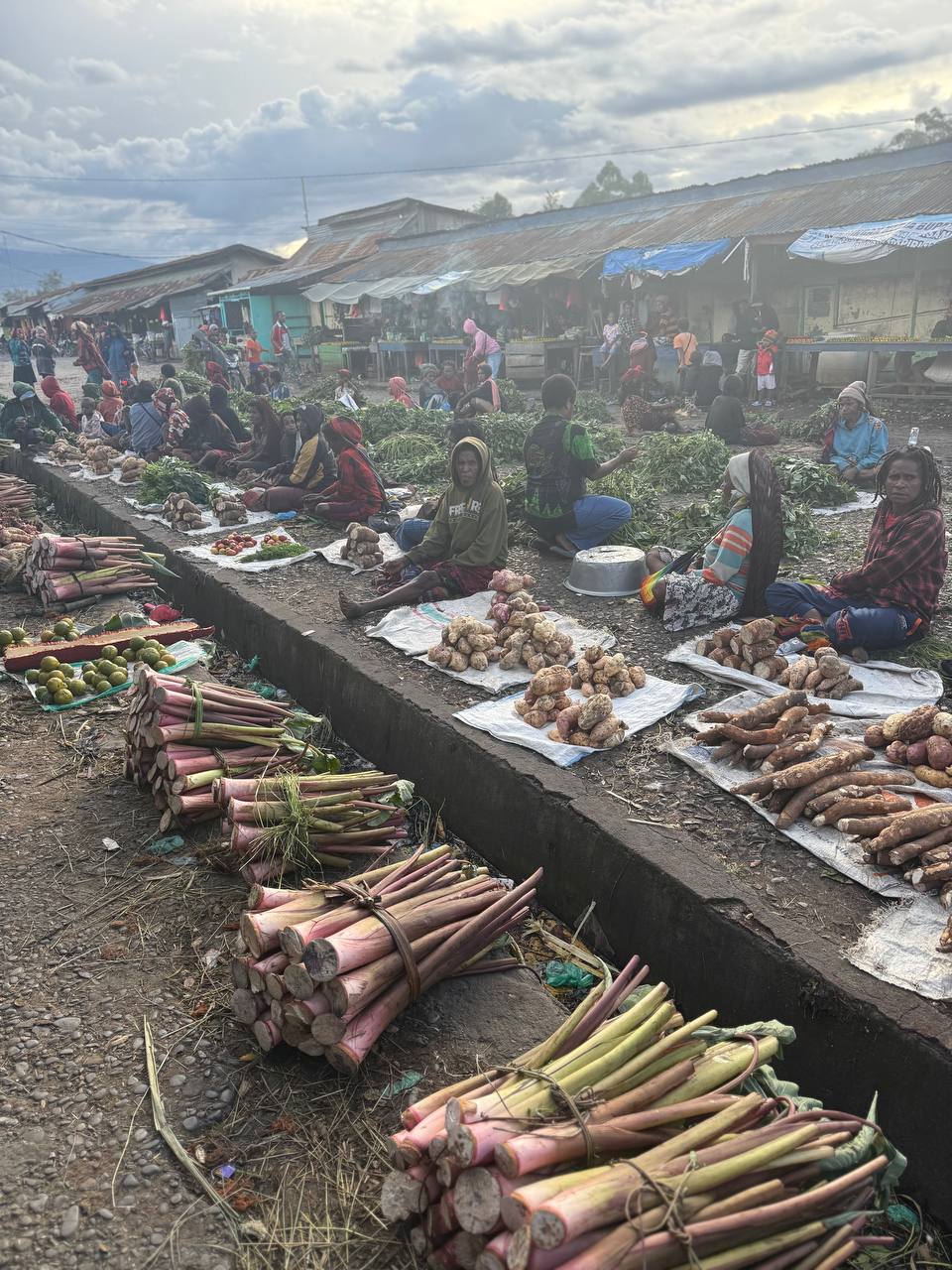Jibama Market is not just the main market of Wamena but the beating heart of the city. This is where the tribes like the Dani, Lani, and Yali come together to trade, meet, and socialise. For locals, it is a vital hub for commerce and cultural exchange.
For visitors it’s a must-visit place that offers a genuine glimpse into life in West Papua’s highlands. The market reflects the traditions and everyday realities of people living in this remote and often misunderstood part of Indonesia.
Table of Contents






What is Wamena?
Wamena is the main town in the Baliem Valley and the hub of the highlands in Papua, Indonesia. It feels a world away from the coastal cities, surrounded by rugged mountains and dense jungle. The town itself is small and rough around the edges but full of life. It acts as a gateway for anyone wanting to explore the remote tribal regions of West Papua.
The streets are often crowded with locals from various tribes dressed in traditional attire alongside modern clothing. Wamena’s altitude means the weather is cooler than the lowlands, and you get a real sense of how isolated and tough life is here. Despite the isolation, it’s the centre of trade, culture, and politics for the highlands. Is it boring? At times, but also interesting enough to do a few days without issue.
What is the Jibama Market?
The market has been around for decades and remains the key social and economic centre for Wamena. People from surrounding villages bring fresh produce, livestock, and handmade goods to sell. It’s not just a place for buying and selling but also where communities gather to share news and keep social bonds alive.
The atmosphere is lively and authentic, far removed from the slick commercial markets on Indonesia’s bigger islands. Compared to Jayapura or even the busy markets in Papua New Guinea like Mount Hagen, Jibama Market is a bit of a nothing, but that ignores just how different the highlands are.





What is Sold Here
Jibama Market is best known for being the main pig market in the city. Live pigs are bought and sold every day. These animals are a huge part of tribal customs, especially in ceremonies and bride price negotiations. If you want a local wife, you better be ready to offer some pigs.
Apart from pigs, the market sells fresh mountain-grown produce like sweet potatoes, taro, leafy greens, and bananas. There are also traditional crafts such as woven bags and jewellery made from local natural materials. The items you find here tell the story of the highland peoples and their connection to the land.
Despite being remote, the market also has some modern touches. There are stalls selling phones and laptops, which feel almost out of place in this environment. It is also really cool to see the t-shirts with the Morning Star flag on them, sold with relative impunity.






Street Food? Not Really
If you’re expecting the usual hustle and bustle of ready-made street food like you’d find in other parts of Indonesia, forget it. Jibama Market is one of the least readymade food markets I have ever seen. There are no snacks, no fried things ready to eat on the spot. The focus here is on raw produce and livestock. However, you will find plenty of betel nut stalls scattered all over. In this town, drugs beat food any day, and betel nut is king.
The locals chew it constantly, often mixed with lime and tobacco, and it stains teeth a deep red. It’s the drug of choice around here, more popular than any kind of street food. You’ll also see raw tobacco being smoked rolled up in leaves, which of course The Street Food Guy purchased….



Tips on Visiting Jibama Market
Get there early in the day when the market is busiest and the livestock trading is in full swing. The ground can be uneven and muddy, so wear sturdy shoes. Talking to locals and getting a feel for the place is part of the experience but always ask before taking photos. The tribal communities here value respect and privacy, especially with the sensitive political situation in the region.
Be open-minded and patient. Haggle if you want but don’t be a twat about it. It’s a place where spending a few extra rupiah is more than worth it for the cultural experience. And yes, cash is king. Make sure you have enough Indonesian Rupiah because there are no ATMs or card facilities anywhere near the market, although Wamena does have ATM’s despite reports to the contrary.
Conclusion
Jibama Market isn’t a sprawling urban market like Jayapura Mall or the Mount Hagen Market in Papua New Guinea. It’s smaller, rougher, and far more rooted in tribal tradition. But that’s what makes it fascinating. If you want to understand the tribal dynamics of West Papua and the complex relationship with the Indonesian government, this market is a good place to start. It’s also the best way to get a sense of everyday highland life in its rawest form.
For anyone visiting Wamena, the market is a lively activity, especially in the early evening when the day winds down. The town itself is quiet and simple, so the market provides an essential social space. One thing to note: you can’t buy alcohol in Wamena, though people do bring it in from Jayapura.
If you want to experience this unique slice of West Papua for yourself, check out my West Papua Tours with YPT.

